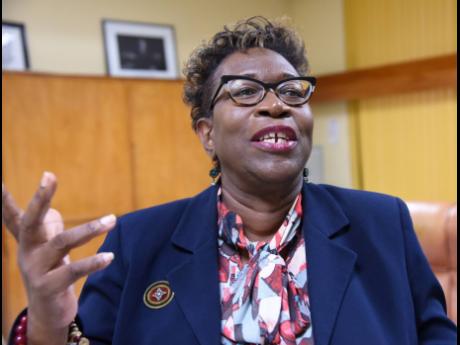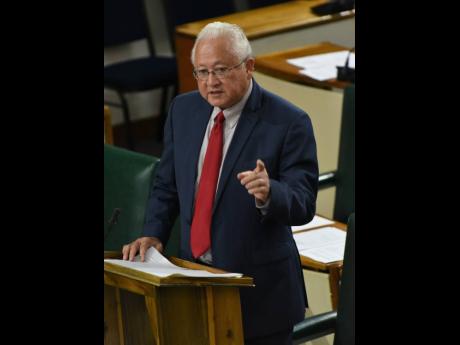Looming ‘unfairness’
• Man freed of gun charges because seven-year wait for court transcript breached his constitutional rights • Second such case in two years
A man who was convicted for shooting two people has been set free because his seven-year wait for the transcript of his trial violated his constitutional rights, Jamaica’s second-highest court has ordered. A transcript is the official record of a...
A man who was convicted for shooting two people has been set free because his seven-year wait for the transcript of his trial violated his constitutional rights, Jamaica’s second-highest court has ordered.
A transcript is the official record of a criminal trial that is produced by the judiciary.
Orville Watson was serving a five-year sentence for illegal possession of firearm and 12 years each for two counts of wounding with intent when the Court of Appeal tossed the convictions and sentences last week.
A panel of three judges declared that his seven-year wait for the transcript of his trial and hearing of his appeal breached his constitutional rights as guaranteed under Section 16, sub-sections 7 and 8 of the Constitution.
Both sections stipulate that a person convicted of a crime is entitled to a copy of any record of the court proceedings within a reasonable time and to have their conviction and sentence reviewed by a superior court.
“As redress for those breaches of the appellant’s constitutional rights in these circumstances, the convictions are quashed, the sentences are set aside and a judgment and verdict of acquittal is ordered for each count on the indictment,” the judges ordered.
Watson is the second man freed of serious criminal charges by the Court of Appeal in almost two years because of delays in the production of a transcript.
Evon Jack was serving 15 years for carnal abuse, five years for buggery and two years for indecent assault when the Appeal Court, in a ruling on July 30, 2021, ordered that his convictions and sentences be quashed.
The allegations involved a child, according to court records.
The court found that his constitutional rights were breached by his eight-year wait for a transcript and the hearing of his appeal.
‘CREEPING STRAIGHTJACKET’
But Paula Llewellyn, the country’s top prosecutor, has warned that both rulings could result in “unfairness” to victims of crimes, complainants and witnesses “who have been courageous in coming forward to give evidence”.
Llewellyn lamented, too, that “through no fault of our own” the prosecuting authority is being placed in a “creeping straight jacket”.
“I am the first to stand up for the protection of the rights of any citizen whether they are accused or complainants or victims, but the pendulum of justice must swing in both directions,” she told The Sunday Gleaner.
Approximately 165 transcripts are currently outstanding, the Court Administration Division (CAD) disclosed on Friday.
That’s a near 50 per cent reduction from the 311 transcripts that were outstanding for the period 2016 to February 2022.
Llewellyn, the director of public prosecutions, said her office now has less room to fight convictions that are the subject of appeals, but “I am not somebody who gives up”.
“Whatever wiggle room we have, we will make the best of it so that justice can be done,” she said.
Llewellyn said her office will have to look at each case on their peculiar facts and the prevailing case law to “see how best to pivot, if possible, in the circumstances in the interest of justice”.
“But there is an elephant in the room and I believe the authorities who are responsible for transcribing the transcripts need – in some sort of accountability to the public and other stakeholders – to indicate what is the problem, what is causing it and what is being done to remedy the situation,” the DDP charged.
SHORTAGE OF SHORTHAND WRITERS
Justice Minister Delroy Chuck said his understanding is that there is “and has been” a shortage of shorthand writers required in the Supreme Court and circuit courts across the island.
“These writers do not get the time to produce the transcripts,” Chuck told The Sunday Gleaner yesterday, adding that Chief Justice Bryan Sykes and CAD are strategising to bring the backlog up to date.
The near 50 per cent reduction in the backlog was the result of several measures already put in place, CAD said.
One senior attorney told The Sunday Gleaner that it would be difficult to assess the impact of both rulings on the 165 cases with outstanding transcripts because each case has to stand on its own set of facts.
John Clarke, who represented Jack before the Court of Appeal, suggested Parliament pass rules that would bring Jamaica closer to its regional counterparts.
As an example, he said in some Caribbean countries appellants are charged a fee to cover the cost of their transcripts, resulting in quicker production.
“If the appellant can’t afford it then they just apply for an exemption, which many people do. That would be one way to deal with the budget shortfall,” Clarke suggested.
There is no charge for a transcript in Jamaica.
He was critical of the authorities, charging that since the Court of Appeal ruling in Jack’s case the budget for the department that oversee court reporters should have been increased.
“The salaries of the persons in that area also should have been increased because they have a shortage and was losing workers to other nations who pay stenographers better than we do,” Clarke asserted.
‘TWO STRIKING FEATURES’
Watson’s case is the latest example of the chronic delay in the production of transcripts by the Jamaican High Court.
He was convicted and sentenced in 2016 to five years in prison at hard labour for illegal possession of firearm and 12 years for each of the two counts of wounding with intent.
The charges stemmed from a 2009 incident in which he allegedly shot a woman and her adult son.
Watson, who has maintained his innocence, challenged his convictions before the Court of Appeal, but had to wait seven years for the transcript of his trial.
When the document was finally delivered, it was missing critical elements such as Watson’s sworn evidence during the trial and verbatim notes of the presiding judge’s “review and treatment of his testimony”, according to the Court of Appeal judgment, which was made public last week.
Without the missing segments, his attorneys Robert Fletcher and Shadae Bailey argued, the Appeal Court is unable to conduct a fair assessment of Watson’s conviction, resulting in a breach of his constitutional rights.
A panel of three Appeal Court judges agreed with their submissions, describing the missing segments in the transcript and the seven-year wait for a hearing of the legal challenge as “two striking features” of the case.
“Due to the unavailability of the complete transcript of the appellant’s [Watson] trial to date, there cannot be a fair determination of whether his conviction was sound,” the judges said.
“Accordingly, there has been a clear breach of the appellant’s constitutional rights under Section 16(8) of the Constitution of Jamaica.”
Lawyers representing the State also conceded that the delays amounted to a constitutional breach.
In a 2021 Sunday Gleaner report, court reporters who are responsible for preparing transcripts complained that chronic staff shortage and malfunctioning equipment made their working conditions difficult.
As an example, one court reporter revealed that a number of stenographic machines in the court system had been out of service “for years because there is no one in the island who can fix them”.
“The only reason there is not a real crisis is because we are able to use the machines of persons who have left the department,” said the court reporter.


